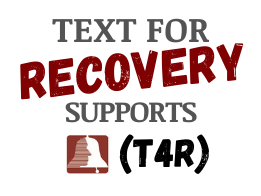SMART Recovery
An abstinence-oriented, not-for-profit organization for individuals with addictive problems.
- Teaches scientifically validated methods designed to empower you to change and to develop a more positive lifestyle.
- SMART Recovery focuses on learning coping skills that work well short – and long-term.
- SMART Recovery’s approach to behavioral change is built around our 4-Point Program®
- Building and maintaining the motivation to change.
- Coping with urges to use.
- Managing thoughts, feelings, and behaviors in an effective way without addictive behaviors.
- Living a balanced, positive, and healthy life.
- Beliefs: What you believe about addiction is important, and there are many beliefs to choose from. We will help you identify, examine, and modify your beliefs about yourself, your problems, and how to change.
SMART Recovery Meeting Locator
Find a SMART Recovery MeetingMedicated Assisted Treatment (MAT)
- Medication-assisted treatment (MAT) is the use of medications, in combination with counseling and behavioral therapies, to provide a “whole-patient” approach to the treatment of substance use disorders. Medications used in MAT are approved by the Food and Drug Administration (FDA) and MAT programs are clinically driven and tailored to meet each patient’s needs.
- MAT is primarily used for the treatment of addiction to opioids such as heroin and prescription pain relievers that contain opiates. The prescribed medication operates to normalize brain chemistry, block the euphoric effects of alcohol and opioids, relieve physiological cravings, and normalize body functions without the negative and euphoric effects of the substance used.
- FDA has approved several different medications to treat alcohol and opioid use disorders MAT medications relieve the withdrawal symptoms and psychological cravings that cause chemical imbalances in the body. Medications used for MAT are evidence-based treatment options and do not just substitute one drug for another.
Moderation Management™ (MM)
A management-oriented, not-for-profit organization for individuals with addictive problems, focusing largely on alcohol and drinking.
- MM provides a non-judgmental, compassionate support community for anyone who wants to change their drinking in a positive way. MM meets each other where we are, support each other as we each find the steps that we can take and encourage each other to keep going when the road gets rough.
- MM provides support through face-to-face meetings, video and phone meetings, chats, and our private online support communities, the MM Forum, the MM Listserv and the MM Private Facebook Group.
- MM is not the right choice for every problem drinker, MM recognizes this and fully support our members who choose abstinence in our MMabsers Many of our abstinent members believe it would have taken them much longer to accept abstinence as the right path for them if they hadn’t attempted moderation with the support of the MM community first. Abstinence periods are an integral part of a moderate lifestyle and because of these abstinent periods, MM members learn to value alcohol-free periods in their life and some members, about 30%, end up choosing abstinence as their chosen lifestyle.
Harm Reduction in Substance Abuse
The harm reduction model of alcohol and drug treatment is a concept that assumes that ceasing drug use altogether is not realistic for some people.This form of treatment seeks to make drug use safer.
- Harm reduction refers to a set of programs, policies, and practices that aim to reduce social and economic consequences of drug and alcohol abuse.
- Core Principles of Harm Reduction
-
-
- Believing that substance abuse is a normal part of human existence, and in turn, society.
- Believing that substance abuse is a normal part of human existence, and in turn, society.
- Believing that substance abuse is a normal part of human existence, and in turn, society.
- Believing that substance abuse is a normal part of human existence, and in turn, society.
- Believing that substance abuse is a normal part of human existence, and in turn, society.
-
- The overall goal of harm reduction is to keep people safe when they abuse drugs or alcohol, instead of an abstinence-only approach.
- May be used in conjunction with MAR / MAT recoveries.
12 Step Groups and Fellowship
- Includes Alcoholics Anonymous, Narcotics Anonymous, and more than 45 other groups that focus on individual – and family – addiction recovery.
- 12 Step Groups are not-for-profit organizations for individuals with addictive problems, oftentimes the type of addiction is specified (ex: Alcohol, Narcotics, Gambling)
- Emphasizes self-reflection, sharing through personal story telling, leadership development, service to others, and generating a sense of belonging to the community.
- Sponsorship in 12 Step Groups:
- Sponsorship during addiction recovery is one of the tenets of 12-step groups. Many who have become, and remained, clean and sober have done so with the help of a sponsor guiding them through the process of recovery. While it has proven to be an effective tool in 12-step circles, some wonder if sponsorship is really an important aspect of addiction recovery.
- Sponsorship requires a sponsor who has a history of sobriety, knows the 12 steps, and can be responsible to a person without becoming responsible for a person. A sponsor is like a close friend who mentors and guides someone with less sobriety through the process of recovery. Typically, a sponsor is another person in recovery who has already worked the 12 steps that are outlined in 12-step programs (like AA).
- A sponsor can be an invaluable resource when an individual feels the urge to drink or use. A sponsor provides crucial support and a background of wisdom that is key for individuals in recovery who are actively working to stay sober.
Behavioral Therapies
- Cognitive-Behavioral Therapy: a therapist helps patients to recognize, cope, and stay away from situations that cause them to use alcohol or drugs.
- Contingency Management: this form of therapy utilizes positive reinforcement in the form of rewards or privileges for those who choose to remain free of drugs or alcohol. Individuals may receive these incentives for attending counseling sessions or taking their medication (as prescribed).
- Motivational Interviewing: also referred to as motivational enhancement therapy, this approach utilizes strategies to help encourage readiness to change addictive behaviors. Sometimes, Motivational interviewing is used alongside other recovery methods (such as cognitive therapy and 12-Step Recovery).
- Family Therapy: helps people working on their recovery as well as close family members. Together, they address addictive patterns and influences. This method of therapy is also designed to help improve family relationships and interactions.
- Psychiatry and psychotherapy often intermingle several of the elements listed above. This can include treatment of addiction and co-occurring mental health disorders with several behavioral therapies, medically assisted detoxification, and prescription management of medications. It may also involve individual therapy sessions.
Pick Your Pathways
No single pathway of recovery is the “right” one for everyone. It’s about which pathway is right for you. And, it’s often not one pathway, but several that help individuals in their substance abuse recovery journey.


